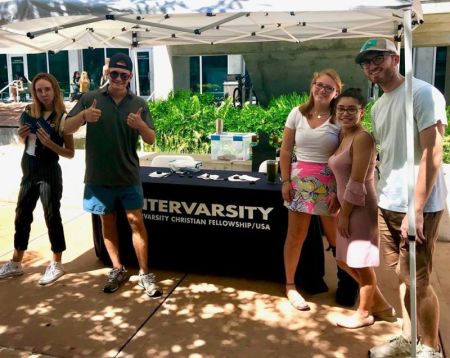InterVarsity Launches '2030 Calling' to Plant Christian Fellowships at 2,500 US Colleges

InterVarsity Christian Fellowship has launched a "2030 Calling" — an initiative to bring Christian fellowships to all major college campuses in the United States in the next 12 years.
As students across the country are returning to campuses this fall, the inter-denominational, evangelical Christian campus ministry announced its new initiative on Monday to bring Christian ministries to all 2,500 U.S. college campuses that have over 1,000 students by the year 2030.
According to the ministry, about 53 percent of those 2,500 schools do not have a known campus ministry presence.
"Our deep conviction is that every student at every university and every faculty member at every university deserves an opportunity to hear the Gospel in a compelling, passionate and personal way from somebody that they know," Greg Jao, Intervarsity director of external relations and senior assistant to InterVarsity President Tom Lin, told The Christian Post. "The best way to do that is to make sure that there is a campus fellowship at every one of those places."
Jao explained that the 2030 Calling is strategic because "today's college students represent the leaders in our churches, government, businesses and nonprofits of tomorrow."
"Reaching today's college students and introducing them to the Gospel and helping them to follow Jesus not only changes their lives but changes the trajectory of our country over decades," he said.
In a statement, Lin explained that the 2030 Calling signals a "new shift" in how the organization approaches campus ministry. He also stressed that the goal isn't necessarily to bring InterVarsity to every campus but to ensure there is some form of fellowship present at all of the campuses.
"This is not about planting InterVarsity's flag on every campus; it's about declaring God's glory on every campus," Lin stressed. "We believe the Lord can use us, in partnership with others, to bring a powerful movement of the Spirit among a new generation of students and faculty. We truly are longing for revival on campus. And we believe that, in the next 12 years, that's exactly what God will do through the 2030 Calling."
As just under 20 million students are attending college in America in 2018, about one-third have no religious affiliation and many are looking for answers to the problems and struggles they face. InterVarsity hopes to change that by partnering with campus ministries, alumni, volunteers and churches to plant new chapters. It also hopes to mobilize millions to pray.

"There are numbers like 30 percent of college students no longer identify as a member of any religious group and that number seems to be growing. While that is troubling, we actually see that as an opportunity," Jao told CP. "For many of the people who identify now as nones, our experience is that does not mean they are rejecting religion particularly. It seems more likely they are rejecting a cultural identification with our religious identity. It is the nominal Christian, the 'show-up-at-holiday' Christian who no longer is willing to be identified as Christian."
For InterVarsity, Jao said that creates a "tremendous opportunity" on campus "because we are now talking to students who recognize that they don't belong to a religion and are uniquely open to hearing the invitation and the demands of the Gospel."
"So over the last 10 or so years, we have watched the number of people making first-time decisions more than double," he explained. "I think with the [trend of] people that thought they were walking away from what they perceived to be organized religion, we are now seeing an era where people are spiritually hungry and ready to respond to the Gospel. That is one of the reasons we think the 2030 Calling is so crucial."
InterVarsity claims that it is "uniquely positioned to reach faculty members" because there were nearly 2,000 college faculty across the U.S. involved with the ministry in the 2017-2018 academic school year.
In its 75-year history, InterVarsity has established communities on 700 campuses across the U.S. Though the 2030 Calling may seem like an uphill battle, InterVarsity is confident in the movement of God.
"InterVarsity is focusing a great deal on how to plant new campuses. Our conviction is that on every campus in the United States, God is already at work. The opportunity is to identify where God is at work and join in with that on campus," said Jao. "We want to do this in partnership with other churches and ministries. This doesn't mean that InterVarsity will get to all 2,500 campuses that we have identified between now and 2030 but if we can equip other ministries and local churches to reach the campus, then God is establishing His work there."
The initiative comes as InterVarsity groups and other Christian ministries have increasingly run into trouble with campus administrators because of organizational policies requiring that group leaders be Christian and uphold a statement of faith.
Most recently, InterVarsity Graduate Student Fellowship and several other Christian and religious groups were derecognized as official student groups by the University of Iowa this summer because the group's leadership policies were said to have violated the school's nondiscrimination rules.
However, the school temporarily reinstated the campus groups earlier this month after InterVarsity took legal action.
InterVarsity is also involved in a lawsuit against Wayne State University in Michigan after the InterVarsity chapter there was booted off campus.
Jao doesn't think the trend facing religious groups on college campuses will prevent the 2030 Calling from being successful.
"We are aware of the challenges around campus access issues," he said. "We are sober about that. But at the purely practical level, even if InterVarsity or a campus ministry can't establish an official presence on campus, I am convinced that nothing will prevent students and faculty from gathering together for Bible study and promoting and accessing resources from InterVarsity or other campus ministries.
"We may not get it there in traditional ways. But I am convinced nothing will prevent the Gospel from getting to those campuses."





















